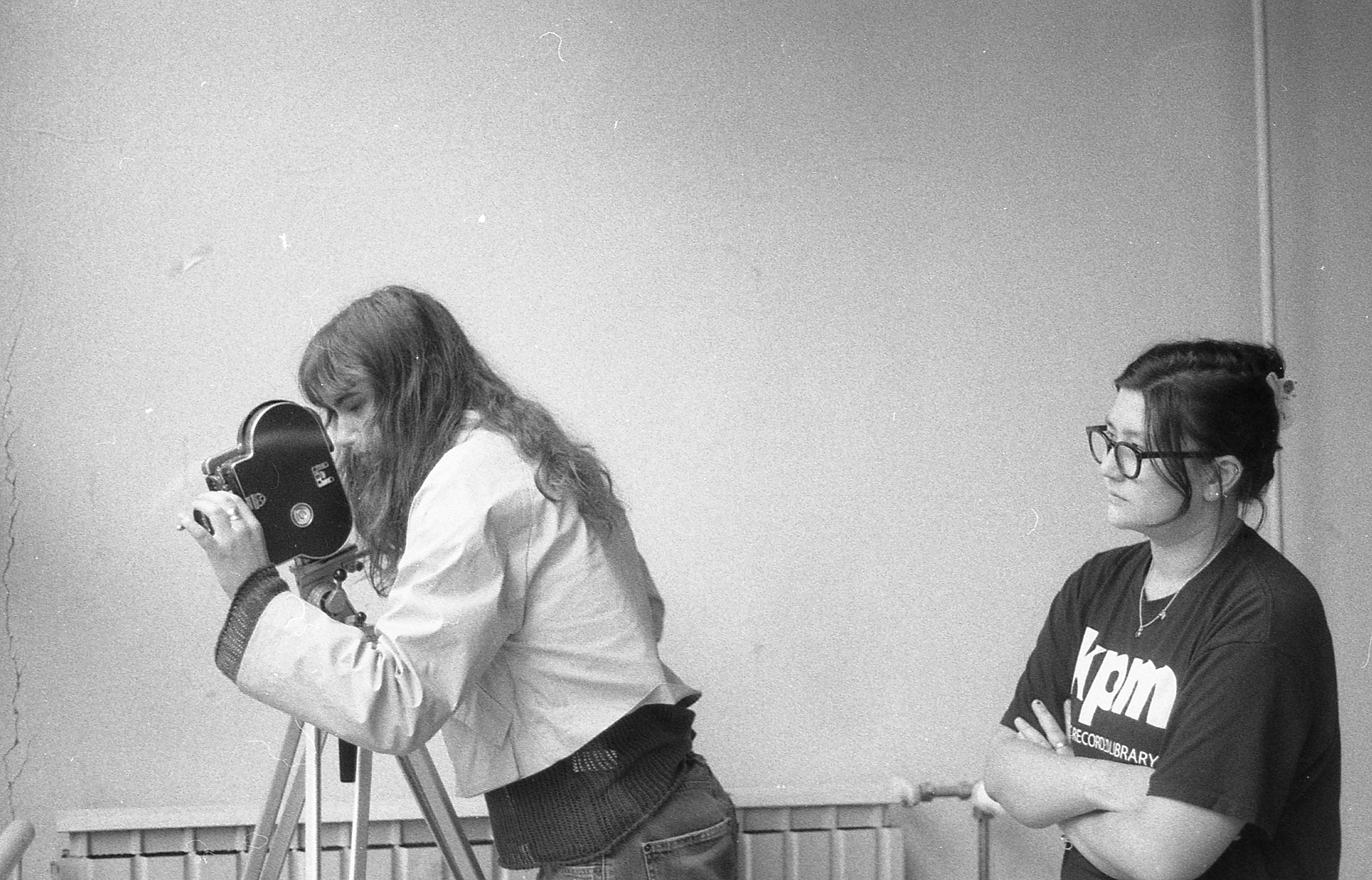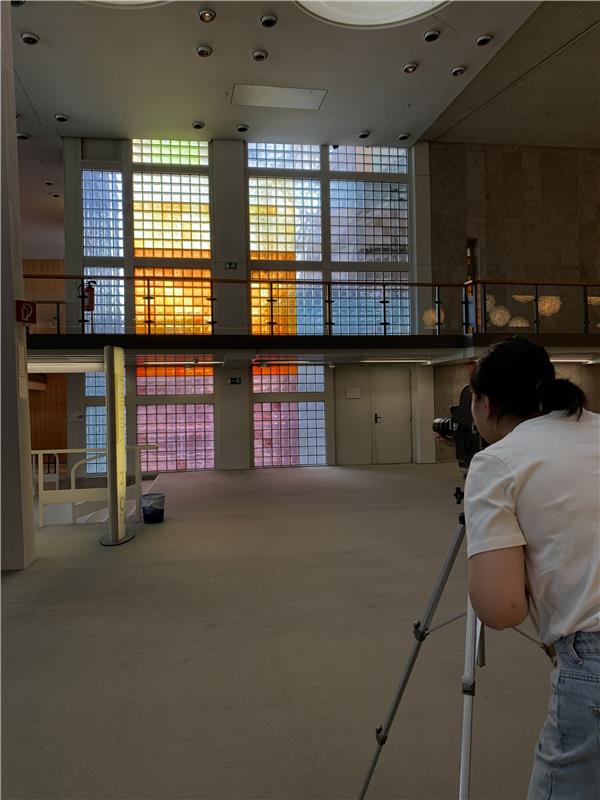
14.12.23 - Studies Abroad: Exploring Berlin’s urbanity through film
“Berlin is a food you have to marinate carefully.”
With this metaphor, the writer, musician and podcaster Musa Okwonga (pictured at centre below) welcomed a group of 18 Daniels Faculty students on their first morning in Berlin as part of a unique global studio led by Assistant Professor Peter Sealy.
Having read Okwonga’s Berlin memoir In The End, It Was All About Love (Rough Trade Books, 2021) before travelling there, the students engaged in a lively discussion about his creative process, why he left Britain for Berlin, and what life is like as a Black, bisexual man in Germany’s capital.
“Musa is a wonderfully generous person whom the students were thrilled to meet,” says Sealy. “His writing captures Berlin’s essence: It’s a city that requires patience to discover in all its complex flavours; you have to find your own way in.”
For Sealy, that “way in” to learning about Berlin is through films. He titled his iteration of ARC 300/2016 “Berlin, A City in Film,” and designed the course to reflect cinema’s powerful role in the construction of Berlin’s image as a modern metropolis. “Berlin’s unique status as a place where movies are made, whether that was in the 1920s or today, makes film an ideal lens for deciphering this huge city,” according to Sealy.
As a historian of media such as film and photography, Sealy himself has studied the Berlin Wall as it has appeared in films. “I believe film is a uniquely accessible medium for students to learn about new places,” he says. “As a society, we constantly consume moving pictures, which often show how people inhabit urban spaces.”
Prior to travelling to Germany, the students watched a series of films set in Berlin, beginning with Wim Wenders’ Wings of Desire (1987). Their spectatorship continued with a series of nightly screenings during their three-week stay in Berlin. Highlights included seeing Walter Ruttmann’s Berlin—Symphony for a Metropolis (1927) at a freiluftkino (open-air cinema) in one of Berlin’s ubiquitous courtyards. The film was accompanied by a live performance by the electronic music group Tronthaim. Other films watched included Roberto Rosseillini’s Germany Year Zero (1948), Heiner Carow’s The Legend of Paul and Paula (1973), Cynthia Beatt’s Cycling the Frame (1988) and Sebastien Schipper’s Victoria (2018).
By day, the students explored the city through an intensive schedule of guided tours, site visits, meetings with local experts, and workshops. Among the highlights was an emotionally moving tour of the archives of the Stasi, East Germany’s secret police: a repository showcasing the banal bureaucracy of evil. Architect and U of T alumnus Bruce Kuwabara arranged a tour of the Canadian Embassy on Leipziger Platz, which he designed with his firm, KPMB Architects. The students also took day trips to Potsdam, Hamburg and Dessau, seeing the famous Bauhaus in the latter.
Yixuan Zhang, a third-year student in the Daniels Faculty’s Bachelor of Arts, Architectural Studies program, “loved exploring buildings we usually only see on [lecture] slides…going inside a building and being able to feel its materials is something I treasured from all our site visits.”
In addition to Okwonga, local Berliners who met the students included the architects Christoph Heinemann, Jochen Jürgensen and plattenbaustudio, the photographer Stefan Berg, and the author Maria Zinfert. In the course’s spirit of experimentation and discovery, one afternoon was spent learning to use analog printing presses at galerie p98a, and an evening was set aside for a Hertha Berlin soccer match at the Olimpiastadion.
The students’ main assignment was to make an eight- or 16-millimetre film using Super-8 or Bolex cameras. To do so, they were guided by three young Berlin-based filmmakers from the LaborBerlin collective: Christian Flemm, Jules Leaño and Adèle Perrin. Working in small groups, the students traversed Berlin, each trying to capture some aspect of the city’s unique spatial tapestry. “The goal of the project,” Sealy says, “was to introduce a new, unfamiliar medium [analog filmmaking] while prompting the students to see Berlin ‘through the lens.’ In other words, making films provided an opportunity to glimpse the city as filmmakers do.”
For Auden Tura, a fourth-year student in Daniels’ Bachelor of Arts, Visual Studies program, “the slowness and careful preparation required for 16mm filmmaking” allowed her and groupmates Ella Spitzer-Stephan and Gillian Stam to consider “Berlin’s urban spaces from a new perspective. With our Bolex, we began to see Berlin’s overgrown courtyards and empty buildings as mystical spaces.” Inspired by Maya Deren’s ground-breaking 1943 short Meshes of the Afternoon—which the students watched at a special screening curated by Flemm—their film investigated the surreal qualities of these semi-abandoned spaces found all over Berlin.

For Taylor Joseph, a second-year student in the Faculty’s Master of Architecture program, the entire cinematic focus of the course proved edifying. “Without the context of the course, I don’t think I would have watched or had the knowledge to be pointed in the direction of these films, most of which are in the German language. They provided a wealth of information on and such insight into the metropolis over generations. As an architecture student, I was able to understand the built environment of the past through the films and thus experience it [more richly] in the present.”
The participating students (both undergraduate and graduate) were drawn from the Daniels Faculty’s many disciplines, including architecture, visual studies and landscape architecture. “I was blown away by the way the students’ own knowledge of architecture and urban practices—how people inhabit cities—helped them decipher a multicultural city like Berlin,” Sealy says. “I took a lot of joy from the students’ own moments of discovery and cannot wait to return as soon as possible!”
“All in all,” concludes Joseph, “every moment of Berlin could make the highlight reel, as it was an unforgettable experience and hopefully will be ongoing.”
“Berlin, A City in Film” was one of four global studios offered by the Daniels Faculty in 2023. Other courses included studies in Athens, Greece; Kumasi, Ghana; and Fez, Morocco. A domestic studio also took place on Fogo Island, Newfoundland and Labrador.
Banner image by John Henry. Last image by Mint Song. All other photos by Peter Sealy.


